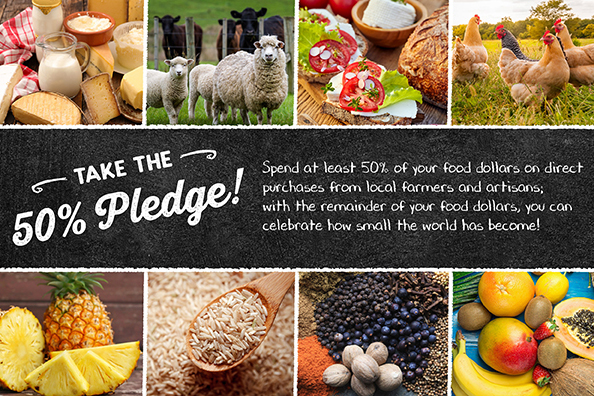


Farmer, Wife and Law on Trial in Florida
November 11, 2019


Take the 50% Pledge!
January 24, 2020by Jill Nienhiser and Sally Fallon Morell
1. Are your cows on pasture? (You’re looking for a yes here, preferably rotated every day through native perennial polyculture pastures.)
2. What do you do in the winter? (They should be on hay, alfalfa, and/or silage in the winter, and may spend time in a loafing shed.)
3. Are your pastures sprayed with anything? (You want a no here.)
4. Do you supplement their grazing with anything? What? (It’s common and fine for farmers to supplement their dairy cows with grain or alfalfa pellets at milking time, otherwise the cows get too thin and produce less milk. Some people who are extremely sensitive to grain seek out 100% grass-fed milk. It will usually be more expensive.)
5. (If supplemented with grain) Is the grain/feed mix locally grown? Does it contain GMO ingredients? (Locally grown with organic methods is best, and non-GMO, no soy. Ideally, the grains would be sprouted.)
6. Do you supplement the cows’ diets with salt or minerals? (They should have free choice salt/minerals/kelp while grazing.)
7. Do you vaccinate your cows? For what? (Ideally, they won’t be vaccinated, but some states require it.)
8. How do you treat sick cows (especially how do you treat mastitis)? (Homeopathy, herbal treatments, vitamin C, and cod liver oil are all good treatments.)
9. Do you exclude a sick cow’s milk from use? For how long? (Exclude mastitis milk until it clears up–Use the California Mastitis Test to confirm.)
10. How do you clean your cow’s udders prior to milking? (Best is to clean the udder with an iodine solution just before milking.)
11. Do you milk by hand or machine? (Most will probably use a machine. The kind that milks directly into a closed stainless-steel container is best.)
12. How is the milk chilled? (It needs to be chilled down quickly–ice bath is best.)

